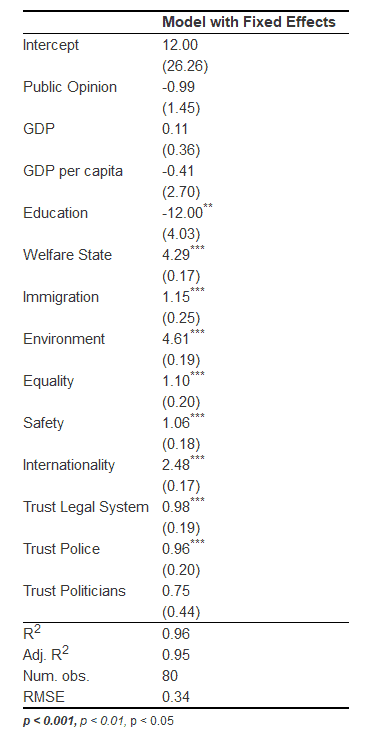
Policy Challenge
When it comes to policy making, there is one crucial issue that must be tackled: responsiveness to public opinion. If governemnts as well as international forums like the G7 and G20 fail to acknowledge the preferences of the citizens they represent, policy solutions to pressing issues fall short of effectiveness and efficiency. This is because the positive outcomes of policy solutions are maximized only when these are in line with what citizens deem to be priorities. For example, policies aimed at protecting the environment became increasingly effective with the rise in environmental awareness of the last decades and the consequent change in perspective of the general public. Therefore, increasing the responsiveness of global governance forums to public opinion would lead to better policy alternatives as well as more effective and efficient solutions to tackle critical issues, such as environmental degradation and the transformation of the welfare state.
Context
Especially in the past years, governements and global policy forums seem to have grown more and more detached from the primary interests of the citizens they represent. As a result, people have started to question the role and the goals of these institutions. This has undermined their legitimacy and authority, leading to a decrease in the level of importance attributed to the solutions to policy issues discussed and suggested by these forums. Furthermore, the gap between the citizens and the global governance forums is also reflected in their political agenda. For example, during the G20 summit that took place in Hamburg in July 2017, scholars complained that key issues like the partnership with Africa were only briefly discussed even though many researchers clearly identified them as crucial topics (University of Toronto, 2017).
Another consequence of the disconnection between global governance forums and public opinion is that even though the policy issues that are identified as critical by the general public are addressed during the summits, they might not be discussed in the way that public opinion considers to be the most appropriate and beneficial to society. Relevant topics, such as sustainable global supply chains and employment were discussed, but the perspective of the general public (Berger, 2017) was often overlooked.
Analysis
To better understand the role of public opinion in policy making and to examine which key factors influence it, in my master’s thesis project (Giuliani, 2020), I have researched the impact that changes in public opinion have on changes in expenditure of the European Commission across ten policy fields. Based on an analysis of the publicly available expenditure records of the European Commission and the data contained in the European Social Survey, I carried out an ordinary least squares regression complemented by a difference-in-differences model. These two methodologies allowed me to check whether there is correlation between public opinion and expenditure, infer causal claims and to check what variables influence their relationship (Wooldridge, 2013).

Having cleaned the data, checked for linearity and included fixed effects, the output of the analysis shows that there is a highly statistically significant correlation between changes in public opinion across policy fields (the only exception is the category of public opinion with regard to trust in politicians) and adjustments in expenditure. This indicates that the policy decisions taken by the European Commission are strongly impacted by the perspective that the general public has on policy issues. Furthermore, the output of the analysis shows that education is a key factor to consider. Specifically, for each additional percentage point of population aged 18-24 that left education and training early, there is a decrease of twelve units of expenditure.
The output seems to indicate that not only educated citizens influence the policy-making process of the European Commission, but that the more educated people are, the more significant the changes in expenditure in the ten policy fields examined.
Policy Reccomendations
There are three crucial policy recommendations that derive from this analysis. Firstly, policymakers should invest in education to ensure that citizens can participate and influence policy decisions more actively. Secondly, they need to encourage the public to get informed in order to have a better understanding of policy making procedures and the context of certain decisions. Lastly, they should aim at bridging the gap between their standpoint and the perspective of the general public to limit possible differences and contrasts in designing policies.
An article by Andrea Giuliani, YGC 2020/21.
___
The views and opinions expressed in this article are those of the author and do not necessarily reflect the views of the Global Solutions Initiative.
___

Andrea Giuliani, Italy, Young Global Changer of 2020, specialised in public sector digitalisation during his studies at the Hertie School. Prior to his graduate studies, he completed a Bachelor of Arts in International Relations: Politics and History with a minor in Global Economics and Management at Jacobs University. While at the Hertie School, he spent an exchange semester at Duke University. Complementing his academic experience, Andrea worked at adesso SE and Capgemini on the digitalization of the German public sector and he is currently employed as Business Design Consultant at IBM iX. He took part in the Global Public Policy Network Conference in Singapore in March 2019, and he is a fellow at the Young Global Changers programm.
